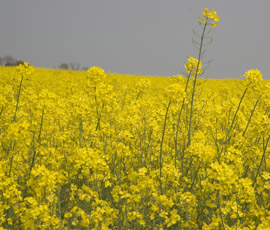Government rejects science behind neonics ban

The UK government has accepted it must abide by EU laws and ban pesticides linked to a decline in bee health, but it has rejected the science behind the ruling.
Last April, the European Commission announced an EU-wide two-year moratorium on the use of three neonicotinoids on crops considered attractive to bees, such as oilseed rape, maize and sunflowers.
The ban will come into force across the EU on 1 December and it will apply to products containing the three active ingredients – imidacloprid, thiamethoxam and clothianidin – which are commonly used as seed coating for UK crops.
“We opposed these restrictions because our assessment was (and remains) that evidence did not point to risks to pollinators that would justify restrictions,” said the government in a report published in response to the Environment Audit Committee (EAC) on Tuesday (10 September).
“Nevertheless, the commission have adopted the proposals and we will implement them in full when they come into effect on 1 December. The decision includes a review of restrictions in 2015.”
But the government dismissed the idea of banning sales of neonicotinoid products in garden centres and for use in parks.
In its report, the government agreed that several laboratory studies had had “raised concerns” about the potential for effects of neonicotinoids on bees. However experience shows that effects found in laboratory conditions were “not always replicated in the field”, the report adds.
For example, a FERA study which placed bumble bees within landscapes known to contain oilseed rape treated with neonicotinoids found “no relationship between colony growth and neonicotinoid residues within pollen or nectar in the colonies”.
The FERA study is “representative of an increasing number of field-realistic studies that have failed to find an effect of neonicotinoids on bees”, said the government’s report.
The report also raises concerns about the effect that the loss of neonicotinoid products will have on the UK agricultural industry.
“Agriculture is a very resilient industry and UK farming could, very likely, manage without neonicotinoids,” it says.
“It is likely that the impacts of loss of neonicotinoids on crop productivity would be variable. Some farm operations in some years might be significantly affected, while others might be affected more lightly.”
However, in the report the government said it was “extremely disappointed” that the commission, in preparing their proposals for restrictions on nenicotinoids, made “no effort to assess the likely knock-on implications”.
These include the “high risk” of increased resistance to alternative pesticides, chiefly pyrethroid foliar sprays, will become more widespread and pyrethroids, which may need to be sprayed on crops up to four times each season, also posed environmental risks.
A DEFRA spokesman said: “We did not support the EU’s neonicotinoids ban. We believe more evidence is needed, so we are using the period of the ban to carry out further research into neonicotinoids and working with farmers, industry and scientists to protect pollinators.”
The government’s report was made in response to an earlier report on neonicotinoids published by the House of Commons’ Environment Audit Committee (EAC), a cross-party committee of MPs.
The EAC’s report – Pollinators and Pesticides – published in April, urged the government to follow recommendations made by the European Food Safety Authority (EFSA), the EU’s food safety watchdog, and suspend the use of neonicotinoids.
Labour MP Joan Walley, chairman of the EAC, said she was disappointed that the government had not accepted the “great weight of scientific evidence that points to the need for the ban on these pesticides in line with the precautionary principle”.
She added: “The committee will maintain its watching brief in the run-up to the 2015 review of the moratorium and will judge the available evidence on its merits; we hope that the government will adopt a similar approach.”
NFU horticulture adviser Chris Hartfield said the government’s stance was a “very balanced and sensible reaction” to the EAC’s report.
“Pollinators are essential for maintaining our biodiversity and pollinating many agricultural and horticultural crops. To ensure they are rightly protected from whatever damaging challenges they face, it is essential that our actions are led by the science,” added Dr Hartfield.
Meanwhile, green campaigners Friends of the Earth accused the government of “turning a blind eye to the overwhelming scientific evidence on one of the main causes of bee decline in the UK”.
Syngenta and Bayer CropScience have legal challenges over the commission’s decision to ban their agrichemical products containing neonicotinoid active ingredients.
HGCA says neonics ban may cost over £72m

